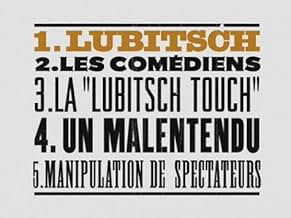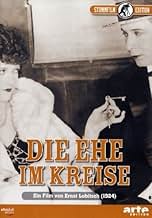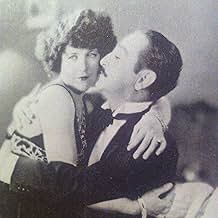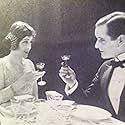VALUTAZIONE IMDb
7,0/10
1595
LA TUA VALUTAZIONE
Aggiungi una trama nella tua linguaProfessor Stock and his wife Mizzi are always bickering. Mizzi tries to seduce Dr. Franz Braun, the new husband of her good friend Charlotte.Professor Stock and his wife Mizzi are always bickering. Mizzi tries to seduce Dr. Franz Braun, the new husband of her good friend Charlotte.Professor Stock and his wife Mizzi are always bickering. Mizzi tries to seduce Dr. Franz Braun, the new husband of her good friend Charlotte.
- Premi
- 2 vittorie totali
Recensioni in evidenza
Have always found Ernst Lubitsch to be a very gifted director. When he was at his best, like with 'Trouble in Paradise', 'The Shop Around the Corner', 'Heaven Can Wait', 'To Be or Not to Be' and 'The Merry Widow', he was brilliant. Although so many directors at their worst fared far worse than him, Lubitsch was not immune from disappointment. Was not crazy about 'That Uncertain Feeling' for example and 'Eyes of the Mummy' was a dud.
'The Marriage Circle', his first film for Hollywood when diverting away from his German silents, however is thankfully closer to Lubitsch being on top form than being a disappointment or a slightly conflicted sort of film (he also had those early on). Instead it is one very well rounded, quite beautifully so even, circle. It was remade as 'One Hour With You' in 1932, which was just as good if not quite with the story being a little better done in 'The Marriage Circle'.
My only complaint of 'The Marriage Circle' is the ending, which felt abrupt and on the silly side. Which also coincidentally happened to the weak link of 'One Hour With You' too.
Otherwise it really sparkles as a film and one of Lubitsch's best early efforts and where his trademark style was starting to emerge. It did become even more refined from 'The Love Parade' onwards, but one can really see the famed wit and sophistication in his direction here. He also opens up the action enough so that it never becomes stage bound, while not trying to do too much avoiding the danger of the style swamping what's going on. The production values still look very elegant now, especially the clever photography that always feels part of the action and sumptuous decor.
Script is full of smart wit that is sharp and never less than very amusing. The story is also smart and only got a little silly at the end, the telling of it is also full of energy and sophisticated. It is also very touching in parts, with the romantic relationship tenderly handled and the subject done in good taste. Not a dull moment in sight. The cast are on top form with sparkling and never static chemistry together, with Marie Prevost and Adolphe Menjou particularly good.
In conclusion, great. 9/10
'The Marriage Circle', his first film for Hollywood when diverting away from his German silents, however is thankfully closer to Lubitsch being on top form than being a disappointment or a slightly conflicted sort of film (he also had those early on). Instead it is one very well rounded, quite beautifully so even, circle. It was remade as 'One Hour With You' in 1932, which was just as good if not quite with the story being a little better done in 'The Marriage Circle'.
My only complaint of 'The Marriage Circle' is the ending, which felt abrupt and on the silly side. Which also coincidentally happened to the weak link of 'One Hour With You' too.
Otherwise it really sparkles as a film and one of Lubitsch's best early efforts and where his trademark style was starting to emerge. It did become even more refined from 'The Love Parade' onwards, but one can really see the famed wit and sophistication in his direction here. He also opens up the action enough so that it never becomes stage bound, while not trying to do too much avoiding the danger of the style swamping what's going on. The production values still look very elegant now, especially the clever photography that always feels part of the action and sumptuous decor.
Script is full of smart wit that is sharp and never less than very amusing. The story is also smart and only got a little silly at the end, the telling of it is also full of energy and sophisticated. It is also very touching in parts, with the romantic relationship tenderly handled and the subject done in good taste. Not a dull moment in sight. The cast are on top form with sparkling and never static chemistry together, with Marie Prevost and Adolphe Menjou particularly good.
In conclusion, great. 9/10
I wanted to retrace some of the steps in the development of the sophisticated romantic comedy film after reviewing some Oscar Wilde adaptations, of all things, the first great one being Ernst Lubitsch's 1925 "Lady Windermere's Fan." Based on another's play, "The Marriage Circle" seems to be where the director first formulated this new direction; from it, one may trace the evolution to modern and later comedies of sex and remarriage--not only drawing a line from here to Lubitsch's subsequent productions, but also to, say, a piece of classic Hollywood cinema such as "The Philadelphia Story" (1940). Even ignoring all of that, "The Marriage Circle" is delightfully light in tone, avoiding blunt moralizing, which somewhat obscures in seemingly superficial fluff what is some clever and subtle filmmaking--the "Lubitsch touch"--although his subsequent "Lady Windermere's Fan" is even better.
The circle of adulterous flirtation begins with a professor hiring a detective to gather evidence for a divorce from his wife, Mizzi, who, indeed, tries to woo the doctor husband of her friend, who, in turn, is admired by her husband's partner Gustav. Initially, the doctor's wife also mistakingly believes that her husband is having an affair with yet another woman. And around they go. The film is full of knowing looks and dramatic irony from characters misreading what they see. Like "Lady Windermere's Fan," there are some nice-looking shots involving windows and doors. A sly smile creeps up on the professor's face after he peers out a window to see his wife getting into a cab with the doctor, and there are a few compositions of characters seen through doorways. Once derided, but now celebrated by some like me, as "the director of doors," Lubitsch also includes a humorous episode where the doctor storms out of an apartment through four doors to get outside.
The cast is OK, although I mostly prefer the leads in Lubitsch's 1932 remake "One Hour with You." Monte Blue plays frazzled well enough as the doctor, but I prefer him in Lubitsch's later picture, "So This is Paris" (1926), and compared to Maurice Chevalier in the 1932 film, he's not preferred. And while I like that Marie Prevost's curls remind me of Clara Bow, her character comes off as too vampish and pathetic next to Genevieve Tobin's joyous Mitzi in the remake. The one big exception to my preference for the 1932 cast is Adolphe Menjou, who is perfect as the impervious professor. One benefit of Mizzi's characterization in this version is that it leads to a virtuoso, some-20 seconds long take of Menjou's startled expression when she hugs him--even though that scene, dropped from the remake, is a rather dramatic red herring. And the opening scene between the two is remarkable for conveying their marriage in disarray visually without needless intertitles.
Circling back, besides the emphasis on looks and the connected use of doors and windows, as well as the comedy of manners and misconceptions of infidelity, "The Marriage Circle" and "Lady Windermere's Fan" have a few more things in common. Both feature potentially adulterous couplings in a garden scene during a party, with the wife mistaking her husband for being caught in the act. Characters in both misread and reveal information from letters and other written documents, including dinner-party seating arrangements. The doctor's hat here also serves a similar function to that of the fan in the other film, and there are similar final scenes involving re-coupling and cars, which both resolve and prevent the narratives from becoming moral lessons. Where I'd fault "The Marriage Circle," by comparison, though, is that it doesn't seem quite as polished. The characters aren't quite as well rounded; the doctor's wife's jealousy on four separate occasions and pushing him away twice, seems repetitive, for instance--rather too circular. That three times shots of letters are repeated bothered me, too--I mean, we already read them, so shots of characters looking at them instead of just the letters themselves would suffice.
To come full circle, "The Marriage Circle," while establishing a precedent, of course, also has its antecedents, besides the earlier, more broad and grotesque comedies by Lubitsch while in Germany. Charlie Chaplin's "A Woman of Paris" (1923) is a frequently cited one, with the casting of Menjou in both films, in particular, being considered a nod by Lubitsch to Chaplin's display of a more deliberate form of pacing, a witty focus on particular details and a more restrained kind of cinematic acting within a more modern story--even though Chaplin's film suffers, unlike "The Marriage Circle," from its overbearing melodramatics. There are also the prior sex dramedies by Cecil B. DeMille, but they lack a similar level of narrative or visual sophistication, and even their titles indicate their greater gender imbalance, while perhaps simultaneously over-selling the sensationalism of the subject matter ("Old Wives for New," "Male and Female," "Don't Change Your Husband," "Why Change Your Wife?") compared to "A Woman of Paris" and the "The Marriage Circle," which respectively suggest femininity and gender equality, as well as sex. When the doctor's wife here states their infidelities to be "fifty-fifty," she's not far off. (Now, how the guy (DeMille) who went on to make Biblical epics started out with stories of marital infidelity and sexual promiscuity is a development in film history I may want to revisit later, too.) Discovering the formula that worked, Lubitsch remained rather faithful to the production of sophisticated romantic comedies, through his musicals, such as the remake "One Hour with You," to his other classic films of the 1930s and 1940s.
The circle of adulterous flirtation begins with a professor hiring a detective to gather evidence for a divorce from his wife, Mizzi, who, indeed, tries to woo the doctor husband of her friend, who, in turn, is admired by her husband's partner Gustav. Initially, the doctor's wife also mistakingly believes that her husband is having an affair with yet another woman. And around they go. The film is full of knowing looks and dramatic irony from characters misreading what they see. Like "Lady Windermere's Fan," there are some nice-looking shots involving windows and doors. A sly smile creeps up on the professor's face after he peers out a window to see his wife getting into a cab with the doctor, and there are a few compositions of characters seen through doorways. Once derided, but now celebrated by some like me, as "the director of doors," Lubitsch also includes a humorous episode where the doctor storms out of an apartment through four doors to get outside.
The cast is OK, although I mostly prefer the leads in Lubitsch's 1932 remake "One Hour with You." Monte Blue plays frazzled well enough as the doctor, but I prefer him in Lubitsch's later picture, "So This is Paris" (1926), and compared to Maurice Chevalier in the 1932 film, he's not preferred. And while I like that Marie Prevost's curls remind me of Clara Bow, her character comes off as too vampish and pathetic next to Genevieve Tobin's joyous Mitzi in the remake. The one big exception to my preference for the 1932 cast is Adolphe Menjou, who is perfect as the impervious professor. One benefit of Mizzi's characterization in this version is that it leads to a virtuoso, some-20 seconds long take of Menjou's startled expression when she hugs him--even though that scene, dropped from the remake, is a rather dramatic red herring. And the opening scene between the two is remarkable for conveying their marriage in disarray visually without needless intertitles.
Circling back, besides the emphasis on looks and the connected use of doors and windows, as well as the comedy of manners and misconceptions of infidelity, "The Marriage Circle" and "Lady Windermere's Fan" have a few more things in common. Both feature potentially adulterous couplings in a garden scene during a party, with the wife mistaking her husband for being caught in the act. Characters in both misread and reveal information from letters and other written documents, including dinner-party seating arrangements. The doctor's hat here also serves a similar function to that of the fan in the other film, and there are similar final scenes involving re-coupling and cars, which both resolve and prevent the narratives from becoming moral lessons. Where I'd fault "The Marriage Circle," by comparison, though, is that it doesn't seem quite as polished. The characters aren't quite as well rounded; the doctor's wife's jealousy on four separate occasions and pushing him away twice, seems repetitive, for instance--rather too circular. That three times shots of letters are repeated bothered me, too--I mean, we already read them, so shots of characters looking at them instead of just the letters themselves would suffice.
To come full circle, "The Marriage Circle," while establishing a precedent, of course, also has its antecedents, besides the earlier, more broad and grotesque comedies by Lubitsch while in Germany. Charlie Chaplin's "A Woman of Paris" (1923) is a frequently cited one, with the casting of Menjou in both films, in particular, being considered a nod by Lubitsch to Chaplin's display of a more deliberate form of pacing, a witty focus on particular details and a more restrained kind of cinematic acting within a more modern story--even though Chaplin's film suffers, unlike "The Marriage Circle," from its overbearing melodramatics. There are also the prior sex dramedies by Cecil B. DeMille, but they lack a similar level of narrative or visual sophistication, and even their titles indicate their greater gender imbalance, while perhaps simultaneously over-selling the sensationalism of the subject matter ("Old Wives for New," "Male and Female," "Don't Change Your Husband," "Why Change Your Wife?") compared to "A Woman of Paris" and the "The Marriage Circle," which respectively suggest femininity and gender equality, as well as sex. When the doctor's wife here states their infidelities to be "fifty-fifty," she's not far off. (Now, how the guy (DeMille) who went on to make Biblical epics started out with stories of marital infidelity and sexual promiscuity is a development in film history I may want to revisit later, too.) Discovering the formula that worked, Lubitsch remained rather faithful to the production of sophisticated romantic comedies, through his musicals, such as the remake "One Hour with You," to his other classic films of the 1930s and 1940s.
I found The Marriage Circle pretty annoying more for the characters than the acting.
Annoying Mizzi (Marie Prevost) is in a bad marriage to Adolphe Menjou so she decides to go after her friend's doctor husband (Monte Blue) by constantly calling for his services by pretending to be sick. The whole premise here is that the vamp has only to bat an eyelash or drop a shoulder strap and the dopey man falls to his knees enslaved. Monte is married to Florence Vidor and his business associate (Creighton Hale) is mad for her. But Flo loves Monte ... until she suspects he may be playing around (which he is not). The more Monte resists Marie, the more determined she becomes to land him.
Round and round it goes with Marie inserting herself in Monte's life while dumb Flo thinks he's after Miss Hofer (Esther Ralston). The whole conceit is based on no one's being able to see the obvious. This might seem like a sly sex romp but Marie's character is just not likable nor are we ever given any reason for her disdain of Adolphe.
Mizzi should have been tossed out on her ear after causing all this trouble.
An excellent score by the Mont Alto group.
Annoying Mizzi (Marie Prevost) is in a bad marriage to Adolphe Menjou so she decides to go after her friend's doctor husband (Monte Blue) by constantly calling for his services by pretending to be sick. The whole premise here is that the vamp has only to bat an eyelash or drop a shoulder strap and the dopey man falls to his knees enslaved. Monte is married to Florence Vidor and his business associate (Creighton Hale) is mad for her. But Flo loves Monte ... until she suspects he may be playing around (which he is not). The more Monte resists Marie, the more determined she becomes to land him.
Round and round it goes with Marie inserting herself in Monte's life while dumb Flo thinks he's after Miss Hofer (Esther Ralston). The whole conceit is based on no one's being able to see the obvious. This might seem like a sly sex romp but Marie's character is just not likable nor are we ever given any reason for her disdain of Adolphe.
Mizzi should have been tossed out on her ear after causing all this trouble.
An excellent score by the Mont Alto group.
This was Lubitsch's first film for Paramount following Rosita with Mary Pickford and sees him in transcendent form.
A highly sophisticated comedy set in Vienna (possibly to allow for the outrageous conduct of the characters)and rich in complex farce scenarios and intelligent narrative twists played by an excellent cast.
Marie Prevost is extraordinary as the relentless pursuer of the happily married Dr Franz Braum, happily married that is to her best friend played by Florence Vidor. Adolphe Menjou offers a characteristically fine performance as the betrayed husband seeking divorce from his wayward wife. His expressions are hysterical as he reveals his caustic feelings towards his spouse. This film explores issues of marriage, commitment, fidelity and temptation in the Lubitsch style. A very funny, touching comedy that displays Lubitsch's talent for understated sophisticated comedy. This stands alongside some of his best films such as The Shop Around the Corner and To Be or Not to be as an equal.
A highly sophisticated comedy set in Vienna (possibly to allow for the outrageous conduct of the characters)and rich in complex farce scenarios and intelligent narrative twists played by an excellent cast.
Marie Prevost is extraordinary as the relentless pursuer of the happily married Dr Franz Braum, happily married that is to her best friend played by Florence Vidor. Adolphe Menjou offers a characteristically fine performance as the betrayed husband seeking divorce from his wayward wife. His expressions are hysterical as he reveals his caustic feelings towards his spouse. This film explores issues of marriage, commitment, fidelity and temptation in the Lubitsch style. A very funny, touching comedy that displays Lubitsch's talent for understated sophisticated comedy. This stands alongside some of his best films such as The Shop Around the Corner and To Be or Not to be as an equal.
A superb, honest, tender romantic comedy of manners, which features acting today's performers would be hard to match. You can laugh and feel for these characters. Ernst Lubitsch's smart direction keeps the movie always interesting, never dated.
"The Marriage Circle" should be required viewing for today's filmmakers. They'd learn how to reveal characters in emotionally complicated situations with minimum dialogue. And how to tell a story with minimum dialogue. And be funny.
"The Marriage Circle" should be required viewing for today's filmmakers. They'd learn how to reveal characters in emotionally complicated situations with minimum dialogue. And how to tell a story with minimum dialogue. And be funny.
Lo sapevi?
- QuizMotion Picture Magazine (February-July 1924): 'In making the kissing scene in "The Marriage Circle," where the dutiful wife smacks another man other than her husband by mistake, Herr Lubitsch made Florence Vidor and Creighton Hale repeat the event exactly thirty-nine times before the kiss was right. Florence is a very lovely lady, but... well, thirty-nine times!'
- BlooperOn the letter that Dr. Braun writes asking Mizzi to choose another doctor, the printed address on Dr. Braun's stationery misspells Vienna as "Wein"; it is correctly printed as "Wien" as a return address on the envelope of the same letter.
I più visti
Accedi per valutare e creare un elenco di titoli salvati per ottenere consigli personalizzati
- How long is The Marriage Circle?Powered by Alexa
Dettagli
Botteghino
- Budget
- 212.000 USD (previsto)
- Tempo di esecuzione1 ora 25 minuti
- Mix di suoni
- Proporzioni
- 1.33 : 1
Contribuisci a questa pagina
Suggerisci una modifica o aggiungi i contenuti mancanti

Divario superiore
By what name was Matrimonio in quattro (1924) officially released in Canada in English?
Rispondi




























